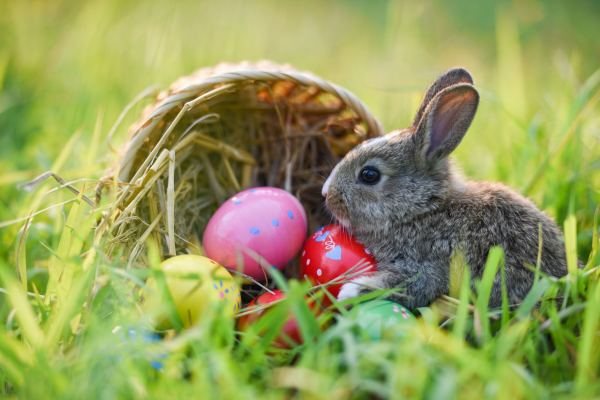Why are Rabbits Associated with Easter?
aster in the Western world is often associated with the Easter Bunny and chocolate eggs. These may seem like strange symbols for one of the most important holidays in Christianity, so where do they it come from? As always, there are several theories.

Some mention ancient pagan festivals. In the UK, there was a festival called Eostre where the Goddess of Dawn and the Spring Equinox was celebrated. It seems that to help convert pagans into the Christian church, pagan festivals were often combined with Christian festivals. This may account for the association of rabbits/ hares with Easter as they symbolised fertility due to their reproductive abundance!
It is believed that the Easter Bunny was first introduced into America in the 1700s by German immigrants. They took with them their story about an egg laying hare called Osterhase or Oster Haws. The story tells of a hare who would lay colourful eggs for children, sometimes even carrots if they were very hungry! Over the centuries the gifts changed and became chocolate eggs and candies and even toys.
Why eggs? Eggs have always represented birth and renewal. It is believed that decorating eggs dates to the 13th century when they were a forbidden food during Lent. You can find out more about this in All you need to know about Pancake Day. People would decorate their eggs and then eat them after Lent to celebrate Easter Sunday.
In Australia they have the Easter Bilby which is a rabbit like marsupial. In Switzerland they have the Easter Cuckoo, and in Germany, where the Easter Rabbit originates, they have the Easter Fox and the Easter Rooster. Eggs and rabbits have been symbolic of Springtime celebrations, birth, renewal and for Christians, the resurrection of Jesus.
Undoubtedly, this time of year is a wonderful time to give gifts to celebrate the possibility of new changes in our lives and those we love. Jin Designs Rabbit Mug and Woodland Collection are ideal gifts to give as an alternative. They not only epitomise this time of year, Spring and Easter, but will last much longer than chocolate treats!
You could even fill up a mug with mini eggs or sweets and wrap it up as a thoughtful Easter surprise — a simple yet delightful gift that can be enjoyed long after the chocolate has gone.


















